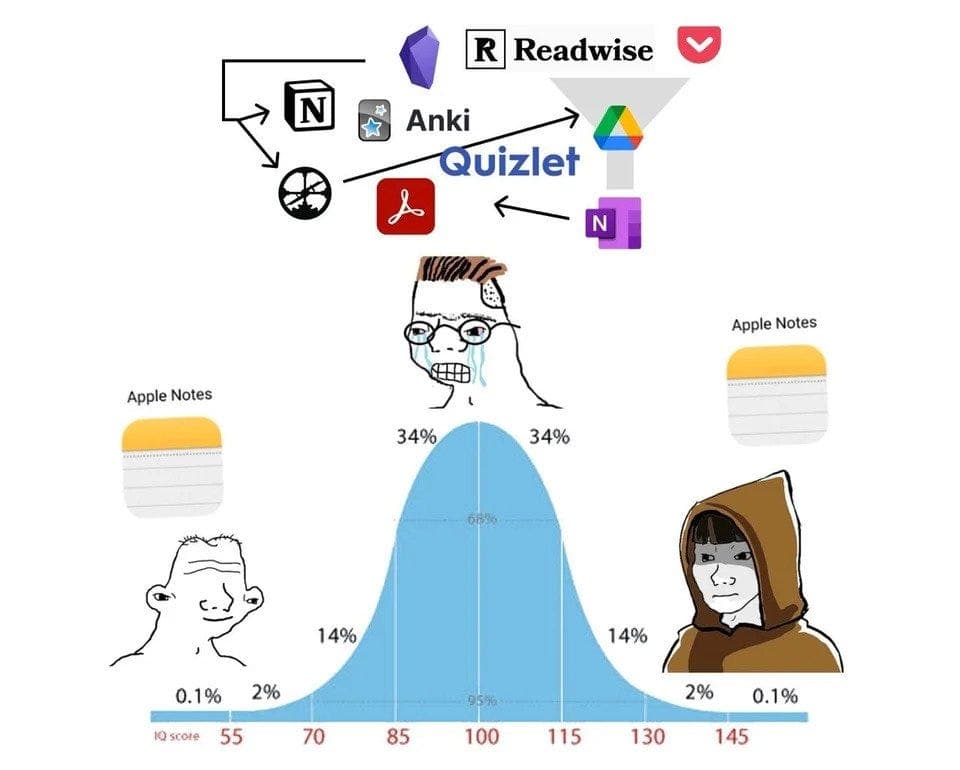Notes, back to the basics.
If you’ve ever entered my home office or seen me at work, there’s always one thing you’ll notice: a notebook. I use it for everything: writing software, solving algorithms, or even jotting things down during casual chats. Why? Well, when our lives are dominated by screens and computers, there’s something grounding about using pen and paper.
If you knew me before 2024, you would’ve never guessed I’d turn to pen and paper. Even in school, I relied on an iPad instead of notebooks. I’ve tried every note-taking tool under the sun — Notion, Obsidian, Logseq, OneNote — you name it, I’ve used it. I’ve been through the second-brain rabbit hole and back. I’m the walking embodiment of the “note-taking bell curve” meme.

But over the past year, I’ve realized something: my paper notes are better. The extra effort and limited space force me to be more deliberate. I’m not here to convince you to ditch your digital tools, everyone’s got their own system. Instead, let me share my process for taking notes.
Good tools.
Younger me would’ve grabbed a three-pack of the cheapest paper notebooks and pens and called it a day. But older me? I’ve come to appreciate good stationery. Think about it — you wouldn’t settle for a lackluster computer or an uncomfortable chair, so why skimp on the tools you use to write?
Invest in a good pen and notebook — it makes all the difference. The experience becomes so much more enjoyable. If you have a stationery store nearby, take some time to explore. There’s an entire world of stationery out there. I use Karst Notebooks and Zebra Sarasa Pens. They’re perfect for me, but the most important thing is finding tools you love to use.
Good tools really do make for a better experience.
An index.
If you’ve worked in software, you’re probably familiar with the principle of indexing. It’s about saving references to specific pieces of data so you don’t have to search through everything later. The same idea applies to note-taking: you need an index for your notes.
An index is simple. Dedicate a page or two at the front of your notebook for subjects and their page numbers. As you write, add page numbers. Then, when you have some time, go back and fill in the subjects and their corresponding pages. This doesn’t have to be perfect; unlike a table of contents, it’s meant to evolve. Go with the flow, and update as needed. It can be as broad or as detailed as you like. Trust me, your future self will thank you.
Notes are pointless if you can’t find what you’re looking for.
Daily notes.
Take notes daily. The goal is to build the habit of using your notebook regularly, but this doesn’t mean taking notes for the sake of it. If you have something worth noting, start a fresh page, add the date and page number, and jot it down.
Your notes can include anything — information, diagrams, or even a to-do list. Whatever it is, just write it. If you have nothing to write, that’s fine too. The key is to take chronological, intentional notes. Don’t stress about structure or indexing as you go; just focus on getting your thoughts on the page.
Optional tasks.
Some folks prefer a more organized approach to their notes. If this sounds like you, consider setting aside time for weekly maintenance. Once a week, you can go back add indexes, transfer notes to a digital system, or highlight important details.
Personally, I don’t stick to a weekly routine. I take care of it whenever I have time. I also don’t transfer my notes to a digital system. That said, if your tasks require strict timing, moving to-dos to a digital system could be helpful. And if your notes contain sensitive information, snapping photos and backing them up is always a smart idea. Ultimately, the best system is the one that works for you.
Ideals.
That’s it — that’s the whole system. The goal of this system is to create a note-taking solution that’s as frictionless and low-effort as possible. The less time you spend maintaining your notes, the more time you can focus on capturing what matters.
If something in your process feels like a hassle, don’t be afraid to change it. What works for me might not work for you, and that’s okay. The best system is the one that fits you.
“Paper is to write things down that we need to remember. Our brains are used to think.” - Albert Einstein